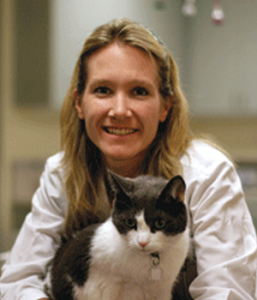-
Adopt
-
Veterinary Care
Services
Client Information
- What to Expect – Angell Boston
- Client Rights and Responsibilities
- Payments / Financial Assistance
- Pharmacy
- Client Policies
- Our Doctors
- Grief Support / Counseling
- Directions and Parking
- Helpful “How-to” Pet Care
Online Payments
Referrals
- Referral Forms/Contact
- Direct Connect
- Referring Veterinarian Portal
- Clinical Articles
- Partners in Care Newsletter
CE, Internships & Alumni Info
CE Seminar Schedule
Emergency: Boston
Emergency: Waltham
Poison Control Hotline
-
Programs & Resources
- Careers
-
Donate Now
 By Lisa Maciorakowski, DVM
By Lisa Maciorakowski, DVM![]()
angell.org/generalmedicine
generalmedicine@angell.org
617-522-7282
The loss of a loved one, two-legged or four-legged, can be just as emotionally devastating for animals as it is for people. Unlike humans, animals cannot comprehend explanations of the loss and are unable to have the conversations that are often healing and consoling to us. Therefore, it is our job to recognize when our pets are grieving and to respond with compassion, patience and understanding as we help them through their grieving process.
As with people, the grieving process varies between individuals and depends on the relationship that had been established with the deceased. Dogs and cats can display both behavioral and physical changes that may last as long as 2-4 months. Some animals will display multiple signs while others may show none.
 If there had been a deep bond, the animal might show signs of anxiety or stress. There may be a change in the social dynamic in and outside of the home. The animal may search frantically for the lost one or sleep in their place. There may also be a change in affectionate behavior. Some cats and dogs may demand more attention. This might be displayed as being more clingy and needy. However, some animals may actually become less affectionate and more withdrawn. Occasionally grief can even be redirected into aggressive behavior towards either the owner or other animals.
If there had been a deep bond, the animal might show signs of anxiety or stress. There may be a change in the social dynamic in and outside of the home. The animal may search frantically for the lost one or sleep in their place. There may also be a change in affectionate behavior. Some cats and dogs may demand more attention. This might be displayed as being more clingy and needy. However, some animals may actually become less affectionate and more withdrawn. Occasionally grief can even be redirected into aggressive behavior towards either the owner or other animals.
A change in territorial behavior may also be noted. The grieving animal might continue to seek out a favorite toy or spot of their loved one. They will often want to stay in that location. Some animals have an increase in frequency and volume of vocalization. This is seen more often in cats than in dogs, though dogs can certainly have an increase in whining or whimpering. It is important not to reinforce such problematic behaviors by responding to console while they are actually doing the unwanted behavior. Do not engage in snuggle time or give affection when they are acting in a way that you do not want. Doing so will reinforce such behavior and likely cause it to continue long into the future. Make sure that you are the one that initiates snuggle time and giving affection.
Many of the possible behavioral changes can appear to be physical changes as well. There may be a change in sleeping patterns- sleeping at different times of day, sleeping more or less, or sleeping in a different location. Changes in eliminations may be noticed, which could include eliminating in a different location or they may have stress diarrhea. A grieving pet may eat more or less than usual, or change the pace of eating, where they are suddenly eating faster or slower.
Some things we can do to help our furry friends to get through a difficult time of mourning are to let them sniff/see the body of the deceased companion if possible in an attempt to help them better understand the situation. Additionally, a favorite possession, like a blanket, can be kept around the house as a reminder for the friend who is left behind. For some people there is the feeling that they should immediately replace their lost friend with a new pet. But it is usually best to allow them to adjust before adding a new family member. It is important for everyone to continue with a regular routine so that a sense of “normalcy” can be maintained. However, an increase in time/attention in the form of playtime or snuggling is always recommended. For those who are withdrawn, try to encourage them to engage but respect if they behave in a way that indicates that they are not yet ready. Increasing exercise and mental stimulation can help everyone.
It is important to remember that grief is a natural response that should not be rushed, but if physical changes such as lethargy, excessive or prolonged loss of appetite or other signs of illness exist or your pet seems to have a setback, then a visit to the veterinarian for evaluation is recommended. It is especially important to note that a cat that does not eat for even a short period of time could potentially get very sick.
It is heartbreaking to watch our beloved pets undergo the painful process of grief. But by recognizing their grief we can help them heal and cope. And in helping your pet through their grief you might ease your pain as well.